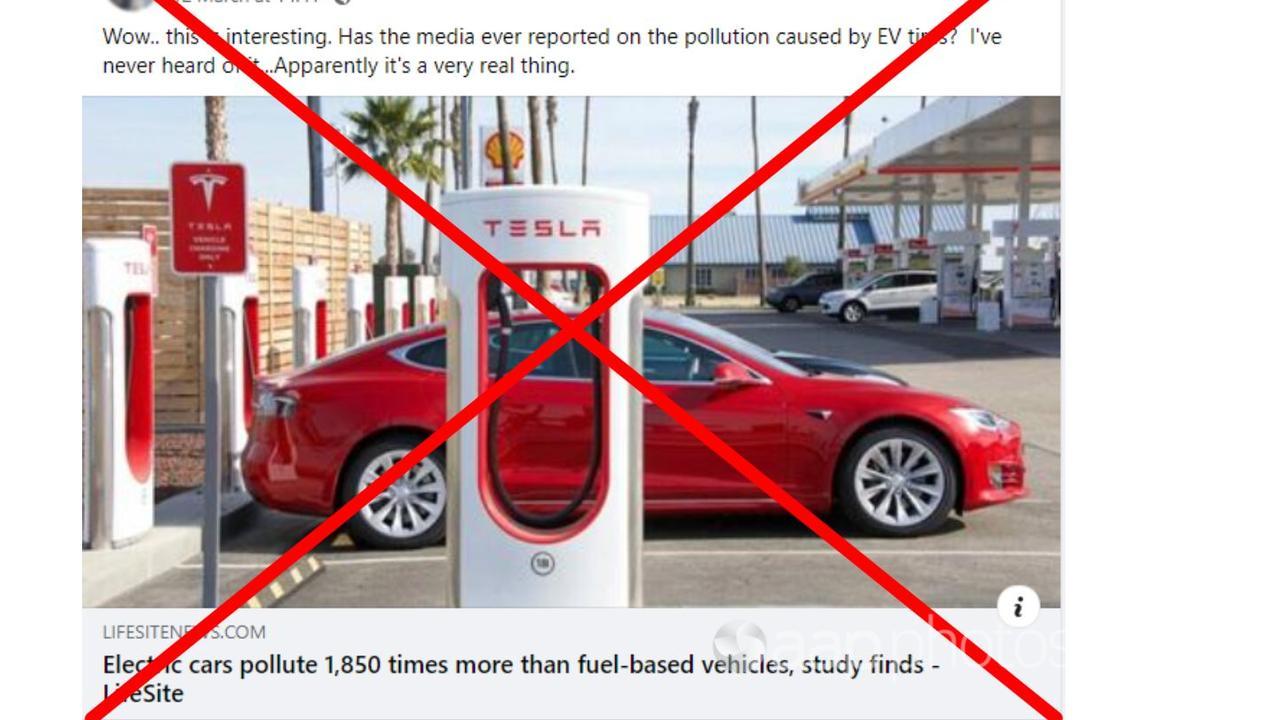It is being claimed that a UK study found that pollution from electric vehicles is 1850 times higher than that from petrol-powered cars.
The claim is false. The study did not compare electric and petrol-powered vehicles. The 1850 times figure refers to tyre wear emissions compared to exhaust emissions in petrol cars.
The claim appears in numerous Facebook posts (examples here, here, here and here) with many linking to a March 13 article on a disinformation website called The People’s Voice.
The article’s headline reads: “Study Finds That Electric Cars Pollute 1,850 Times More Than Fuel Powered Vehicles”.

In its first paragraph, the article says: “The 2022 study by Emissions Analytics … found that during a 1,000 mile journey, EVs release 1,850 times more pollutants into the surrounding environment than gas-powered vehicles, due to the heavier weight which eats through tires”.
But the study from UK-based independent research organisation Emissions Analytics (EA) found nothing of the sort.
EA’s 2022 study looked at the comparison between tyre wear emissions and exhaust particulate mass emissions in petrol-powered cars.
Several vehicles, including a Mercedes C-Class and a Volkswagen Golf, were used in the study, along with 14 tyre brands.
The study found emissions from tyre wear is 1850 times greater than particulate mass exhaust emissions.
Emissions Analytics chief executive Nick Molden told AAP FactCheck the social media claim was “completely false”.
“By choosing to include reference to electric vehicles in the title, it makes it appear that the dominant comparison is between electric and non-electric vehicles, when the central contrast is between tailpipe and tyre emissions whatever the vehicle,” Mr Molden said.

“Our research compares the mass of the tiny particles shed by tyres as they wear with tailpipe particles, which results in the 1850 ratio – which is correct and we stand by.”
The study’s only mention of EVs is a reference to the weight of such vehicles currently on the market. It states that greater vehicle mass, as a result of EV batteries, could lead to an increase in tyre emissions.
“The report of our research changes the phrasing of the headline in a subtle but important way to imply that in some way pollution from BEVs (battery electric vehicles) overall is that much higher,” Mr Molden added.
“This would be a completely false conclusion not least because of the significant CO2 emissions from the tailpipe.”
The Verdict
The claim that a study has found that electric vehicles (EVs) pollute the environment at least 1850 times more than petrol-powered cars is false.
The study made no such finding. Instead, the figure refers to tyre emissions as compared to exhaust emissions.
False – The claim is inaccurate
AAP FactCheck is an accredited member of the International Fact-Checking Network. To keep up with our latest fact checks, follow us on Facebook, Twitter and Instagram.
All information, text and images included on the AAP Websites is for personal use only and may not be re-written, copied, re-sold or re-distributed, framed, linked, shared onto social media or otherwise used whether for compensation of any kind or not, unless you have the prior written permission of AAP. For more information, please refer to our standard terms and conditions.


















